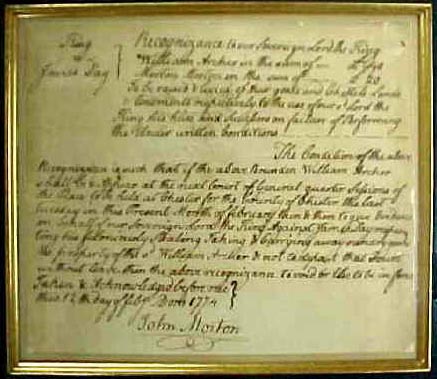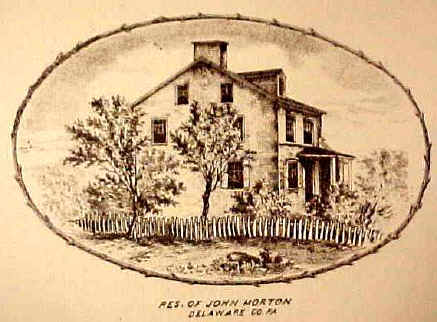John
Morton was a native of Ridley, in
the county of Chester, now
Delaware. His ancestors were of
Swedish extraction, and among the
first Swedish emigrants, who
located themselves on the banks
of the Delaware. His father,
after whom he was called, died a
few months previously to his
birth. His mother was some time
after married to an Englishman,
who possessed a more than
ordinary education, and who, with
great kindness, on young Morton's
becoming of the proper age,
superintended and directed his
education at home. Here his
active mind rapidly expanded, and
gave promise of the important
part which he was destined to act
in the subsequent history of his
country.
About
the year 1764, he was
commissioned as a justice of the
peace, and was sent as a delegate
to the general assembly of
Pennsylvania. Of this body he was
for many years an active and
distinguished member, and for
some time the speaker of the
house of representatives. The
following year he was appointed
by the house of representatives
of Pennsylvania to attend the
general congress at New-York. The
object and proceedings of this
congress are too well known to
need a recital in this place.
In
1766, Mr. Morton was appointed
sheriff of the county in which he
lived, an office which he
continued to hold for the three
following years, and the duties
of which he discharged with great
satisfaction to the public. Some
time after, he was elevated to a
seat on the bench, in the
superior court of Pennsylvania.

Court
Document requiring William Archer
to appear before the General
Court on the
last Tuesday of the present
month. dated February 12, 1774
and signed "John
Morton"
[Source:
"Centennial Book of Signers
..." by William Brotherhead;
Philadelphia : J.M. Stoddart,
[1872?]
Of
the memorable congress of 1774 he
was a member, and continued to
represent the state of
Pennsylvania in the national
assembly, through the memorable
session of that body which gave
birth to the declaration of
American Independence.
On
the occurrence of the momentous
subject of independence, in the
continental congress, Mr. Morton
unexpectedly found himself placed
in a delicate and trying
situation. Previously to the 4th
of July, the states of Delaware
and Pennsylvania had voted in
opposition to that measure. Great
doubts were therefore entertained
by the other members of congress,
how the Pennsylvania and Delaware
delegations would act. Much was
obviously depending upon them,
for it was justly apprehended,
that should these two states
decline to accede to the measure,
the result might prove most
unfortunate. Happily, the votes
of both these states were, at
length, secured in favor of
independence. But, as the
delegation from Pennsylvania were
equally divided, it fell to Mr.
Morton to give his casting vote.
The responsibility which he thus
assumed was great, and even
fearful, should the measure be
attended by disastrous results.
Mr. Morton, however, was a man of
firmness and decision, and, in
the spirit of true patriotism, he
enrolled his vote in favor of the
liberty of his country.
Considering his novel and solemn
situation, he deserves to be
remembered with peculiar respect,
by the free and independent
yeomanry of America.
In
the following year, he assisted
in organizing a system of
confederation, and was chairman
of the committee of the whole, at
the time it was finally agreed
to, on the 15th of November,
1777. During the same year, he
was seized with an inflammatory
fever, which, after a few days,
ended his mortal existence, in
the 64th year of his age. Mr.
Morton was a professor of
religion, and a truly excellent
man. To the poor he was ever
kind; and to an affectionate
family, consisting of a wife,
three sons, and five daughters,
he was an affectionate husband
and father. His only enemies were
those who would not forgive him
because of his vote in favor of
independence. During his last
sickness, and even on the verge
of the eternal world, he
remembered them, and requested
those who stood round him, to
tell them, that the hour would
yet come, when it would be
acknowledged, that his vote in
favor of American independence
was the most illustrious act of
his life.
[Source:
Rev. Charles A. Goodrich Lives of
the Signers to the Declaration of
Independence. New York:
William Reed & Co., 1856.
Pages 282-284. (Some minor
spelling changes may have been
made.)]

Residence of John Morton,
Delaware County, Pennsylvania
[Source:
"Centennial Book of Signers
..." by William Brotherhead;
Philadelphia : J.M. Stoddart,
[1872?]
SEE
ALSO
Old
Swedish Burial Ground-John
Morton's Memorial
John
Morton Homestead-Prospect Park,
Pennsylvania
|